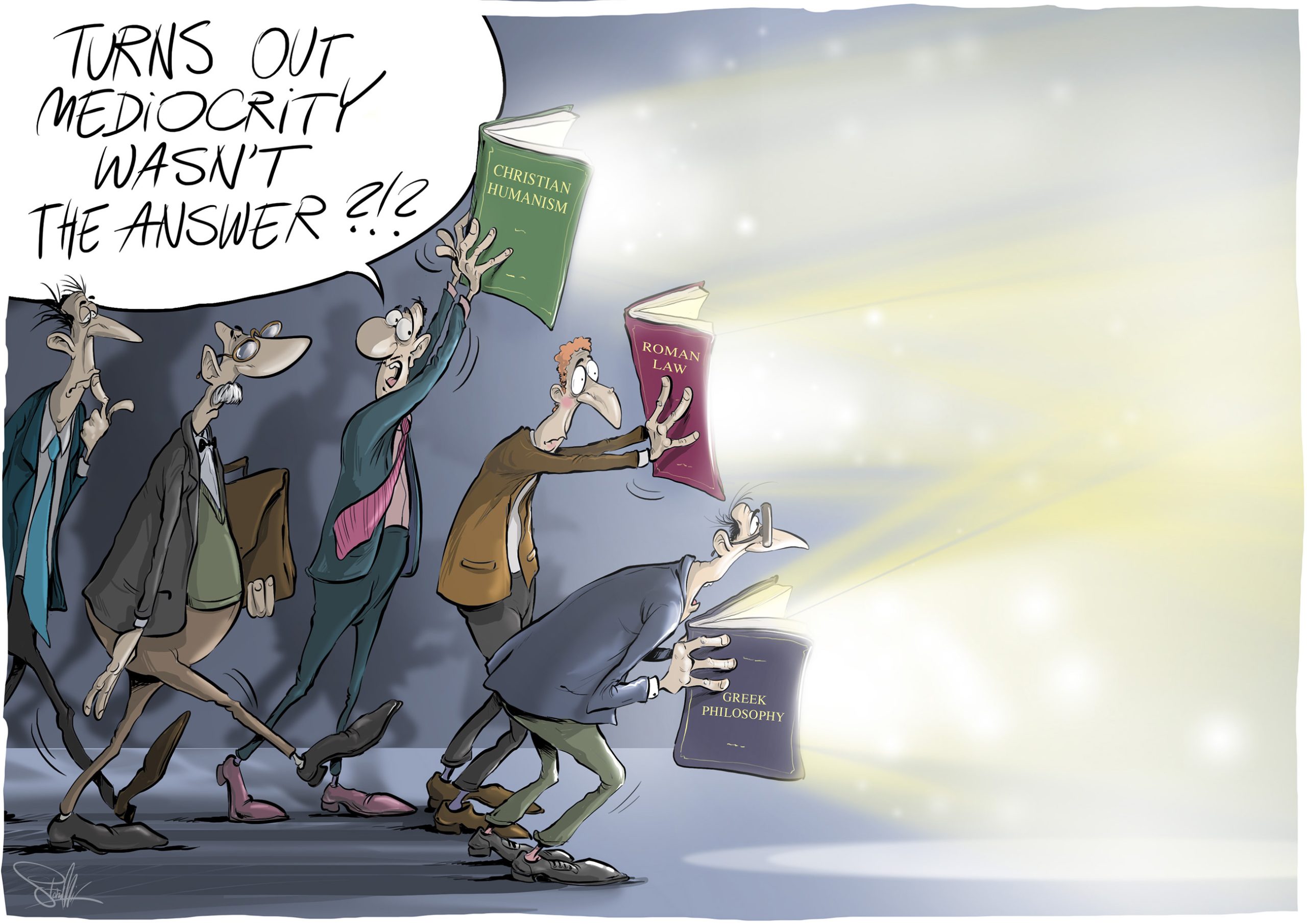Are European elites malicious or oblivious?
Europe is drowning in debt, denial and decay. A return to core values may be its last chance.

Recent developments in politics, economics and social cohesion are troubling for Europe.
France is on the brink of bankruptcy, with deficits still around 6 percent of gross domestic product (GDP). Other countries – including Germany – are not much better off when one considers not only the official debt but also implicit debt.
Implicit debt refers to unfunded provisions for pensions and healthcare obligations. In every large European country, implicit debt is several times greater than explicit debt. A recent study showed that Germany’s total debt amounts to more than a shocking 400 percent of GDP. An aging population will only worsen the situation.
The state’s excessive share of the economy is another burden. On average, government spending accounts for nearly 50 percent of GDP in Europe – an unsustainable state of affairs that stifles efficiency, productivity and competitiveness. For comparison, the figure for the United States is 30 percent.
Failed energy policies, particularly in countries like Germany, have made energy unaffordable for many sectors.
Economic competitiveness is slipping. In 2008, the EU’s nominal GDP was higher than that of the U.S. Since then, the gap has widened dramatically. In 2024, U.S. GDP reached $29.2 trillion, while the EU lagged at $19.4 trillion. Over the same period, China’s GDP jumped from $4.7 trillion to $18.8 trillion, almost equaling that of the EU.
Must Europe first endure high inflation, declining prosperity and geopolitical irrelevance before real measures are taken?
Political weakness is evident. The EU lacked the strength to resist President Donald Trump’s tariff demands. European Commission President Ursula von der Leyen had no choice but to accept a 15 percent tariff. Clear reasoning was also hindered by the bloc’s excessive regulatory protectionism. This approach not only undermines the EU’s negotiating position but also hampers innovation and productivity.
Europe remains heavily dependent on the U.S. for defense and security. Without Washington’s support, the continent is vulnerable to potential aggressors and unable to secure supply chains.
A deeper issue is the neglect of Europe’s traditional values. European civilization was built on the diversity of its peoples and regions, bound together by a shared Judeo-Christian heritage.
Europe adrift in denial
The problems are well known but remain unaddressed. Why?
I cannot provide a definitive answer, only a possible explanation. Europe is in bad shape, economically and politically. The examples above illustrate the current – and unnecessary – malaise. The root of the problem seems to be weak leadership in politics, society and the economy: leaders without the backbone to resist populist claims, focused only on the short term and the next election. It is hard to believe they are either so malicious as to intend this outcome, or so oblivious as not to see it. The more likely explanation is expedient mediocrity.
But citizens are not innocent. A culture of comfortable expediency has taken hold. Now, however, doubts are growing, reflected in the rise of protest parties. It is troubling that established parties refuse to address underlying issues. Instead, they respond with undemocratic “firewalls” against new movements, hypocritically justifying them as a defense of democracy.
The Draghi report on the EU correctly highlighted the weaknesses, but its prescription – common debt – is no solution. It would likely make matters worse.
More by Prince Michael of Liechtenstein
- Russian geopolitics and European security
- Competitiveness and business in a fragmented world
- Can sleepwalking mediocrity lead the world to war?
France now faces a confidence vote, unable to resolve its debt crisis. Germany’s coalition is paralyzed. Governments across Europe, and Brussels itself, see no alternative but to muddle through, clinging to unrealistic illusions and ignoring reality.
The result is a state that grows ever more controlling, restricting economic and personal freedom and eroding privacy. Accountability has been inverted: Instead of governments being accountable to citizens, citizens and businesses are increasingly accountable to the state, suffocated by regulations and reporting requirements. Democratic governments even encourage a culture of denunciation, sometimes dressed up as “whistleblowing” – a practice typical of authoritarian regimes.
Unless drastic steps are taken to reduce the role and cost of the state, the future looks grim. The longer the drift continues, the worse the consequences will be.
Must Europe first endure high inflation, declining prosperity and geopolitical irrelevance before real measures are taken? It is already late, but not too late for preventive action: less state, more personal and economic freedom and greater individual responsibility.
Italy is hardly free of problems, yet Prime Minister Giorgia Meloni at least reminds Europe of its core values. At a political gathering in Rimini, she said: “Our home is the West, a system of values that has enriched the soil where men are born free, where caring for the most vulnerable is an absolute value.” In earlier speeches, she has described this heritage as the synthesis of Greek philosophy, Roman law and Christian humanism, a foundation on which the separation of church and state grew and on which European civilization advanced.
By embracing these values again, Europe could restore the principles of responsible government and public accountability now being squandered by weak leadership.

